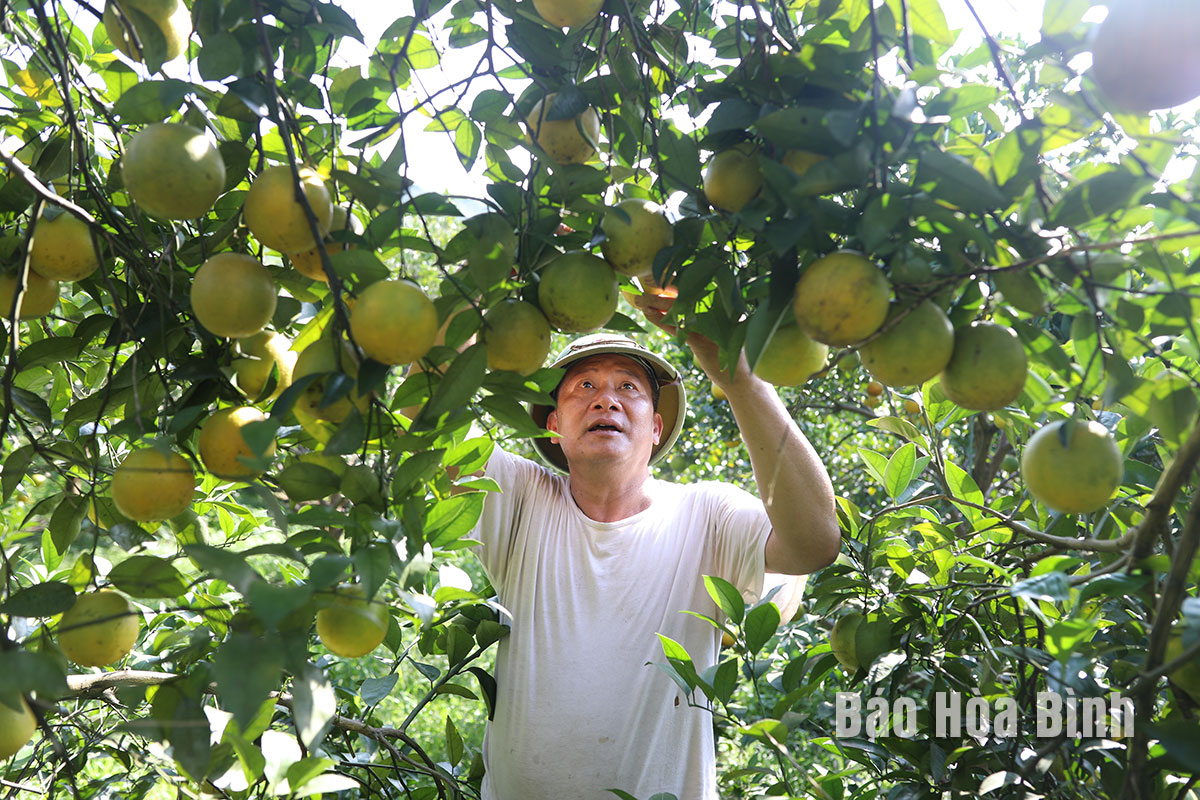
Orange growers in Cao Phong district of Hoa Binh province have enjoyed a good harvest and good prices of the fruit this year.
Photo: Phan Van Tam, a farmer in Cao Phong town of Cao Phong
district in his orange orchard.
Phan Van Tam, a farmer in Cam Phong town of Cao Phong district said that he
started growing orange when he retired in 2017. This year, he harvests about 15 tonnes of orange from his 4,000 sq.m orchard.
Each kilo is sold at 18,000 VND to 20,000 VND (0.7-0.8 USD).
Tam said that he can earn about 300 million VND, with a net
profit around 200 million VND. This year, he and many other local orange
growers are very optimistic because of a good harvest and good prices.
Bui Van Dan, head of the district’s Division of Agriculture and Rural
Development, said that in the 2024-2025 season, the district has more
than 971 ha of citrus trees, including 715.21 ha of oranges with a projected
yield of 302 quintals per ha and an estimated output of 20,348 tonnes; 9.62 ha
of tangerines with a projected yield of 202 quintals per ha and an estimated
output of 194.32 tonnes; 27.9 ha of lemons with a projected yield of 44.6
quintals per ha and an estimated output of 70.9 tonnes; and 218.82 ha of grapefruits
with a projected yield of 169 quintals per ha and an estimated output of 3,698
tonnes.
With the potential for citrus trees farming, particularly
oranges, Cao Phong district has implemented various strategies to support local
farmers.
Orange farming has proven to be a significant economic driver for Cao Phong
district. Cao Phong orange was the first agricultural product in Hoa Binh
province to be officially recognised and protected under a legal framework for
geographical indications in 2014.
In 2016, the International Intellectual Property Institute
awarded Cao Phong orange the title of one of the "Top 10 Famous
Brands." This recognition highlighted the brand's quality and reputation
in the marketplace, reinforcing its status as a notable agricultural product.
Cao Phong oranges are now available in major supermarkets nationwide like Big
C, Winmart, Metro, and BRG.
The district's orange output in several recent years has
exceeded 30,000 tonnes yearly, and each hectare of orange can generate 500 - 700
million VND. Many households have got rich thanks to orange farming.
The district is actively working to preserve and promote the Cao Phong orange
brand. As part of the project to rejuvenate citrus trees in the district for
the 2021-2025 period, with a vision towards 2030, the district has focused on
replanting orange trees and maintaining high-quality, VietGAP-certified
orchards. Models that combine orange cultivation with tourism have been
developed. The district has also paid more attention to applying scientific
techniques in processing, and diversifying orange products.
The district also boost communications to engage people in
preserving the Cao Phong orange brand.
According to data from the Hoa Binh Provincial Party Committee, the industrial production index for the first six months of 2025 is estimated to have increased by 20% compared to the same period last year. This marks the highest year-on-year growth rate for this period since 2020.
In the first six months of 2025, Hoa Binh province’s export turnover was estimated at 1.145 billion USD, marking an 18.11% increase compared to the same period in 2024. Import turnover was estimated at $ 804 million, a 17.15% increase, which helped the province maintain a positive trade balance.
The lives of the ethnic minority farmers in Tan Lac district have gradually improved thanks to the new directions in agricultural production. This is a testament to the collective strength fostered through the professional associations and groups implemented by various levels of the district’s Farmers’ Union.
With the motto the "product quality comes first,” after nearly one year of establishment and operation, Muong village’s Clean Food Agricultural and Commercial Cooperative, located in Cau Hamlet, Hung Son Commune (Kim Boi district), has launched reputable, high-quality agricultural products to the market that are well-received by consumers. The products such as Muong village’s pork sausage, salt-cured chicken, and salt-cured pork hocks have gradually carved out a place in the market and they are on the path to obtaining the OCOP certification.
In the past, the phrase "bumper harvest, rock-bottom prices" was a familiar refrain for Vietnamese farmers engaged in fragmented, small-scale agriculture. But today, a new spirit is emerging across rural areas of Hoa Binh province - one of collaboration, organisation, and collective economic models that provide a stable foundation for production.
Maintaining growing area codes and packing facility codes in accordance with regulations is a mandatory requirement for agricultural products to be eligible for export. Recently, the Department of Agriculture and Environment of Hoa Binh province has intensified technical supervision of designated farming areas and packing facilities to safeguard the "green passport" that enables its products to access international markets.



